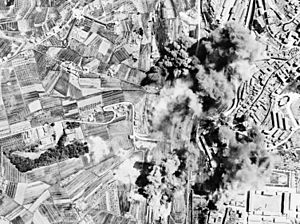Operation Strangle (World War II) facts for kids
Operation Strangle was a big air mission during World War II in Italy. It happened from March 19 to May 11, 1944. The main goal was to stop supplies from reaching German forces in central Italy. American planes, from the United States Fifteenth and Twelfth Air Forces, bombed roads and railways north of Rome.
The Allies wanted to prevent essential supplies from getting to the German army. They hoped this would force the Germans to leave Italy. The idea was to avoid a large ground battle by cutting off their supplies from the air. While the operation didn't make the Germans leave right away, it made things very difficult for them. It also helped the Allies succeed in their next big ground attack, called Operation Diadem.
During Operation Strangle, planes bombed two main supply lines across Italy. This meant no trains could travel directly from the Po Valley to the front lines. South of Florence, almost all supplies had to be moved by trucks. Over eight weeks, Allied planes flew 21,000 missions and dropped 22,500 tons of bombs. The operation covered an area of about 150 square miles, from Rome to Pisa and from Pescara to Rimini.
How the Air War Helped Ground Troops
Before the main ground attack, Operation Strangle helped the Allies gain control of the sky. This is called "air superiority." During the ground attack, planes kept bombing supply lines. They also provided "close air support," which means planes helped soldiers fighting on the ground.
Planes started bombing more roads instead of just railways. They also focused on areas closest to the enemy lines. The goal was to make it impossible for the Germans to move supplies and get what they needed locally.
These efforts made it harder for the Germans to get fuel and ammunition. However, the Germans were good at finding other routes. They also quickly fixed damaged roads and railways, especially at night or in bad weather when Allied planes couldn't bomb. The Germans didn't need a lot of supplies during Operation Strangle, so they were still able to keep their forces going.
Unexpected Success of the Operation
One of the biggest benefits of Operation Strangle was something the Allies didn't plan. It made it very hard for German troops to move around. The Germans didn't have extra forces waiting behind their front lines. They relied on being able to move their soldiers quickly to weak points in their defenses.
Because of the constant bombing, they couldn't move their forces fast enough. This made them much weaker in battle. About three weeks after the ground campaign began, the German army was forced to retreat.
 | Isaac Myers |
 | D. Hamilton Jackson |
 | A. Philip Randolph |


